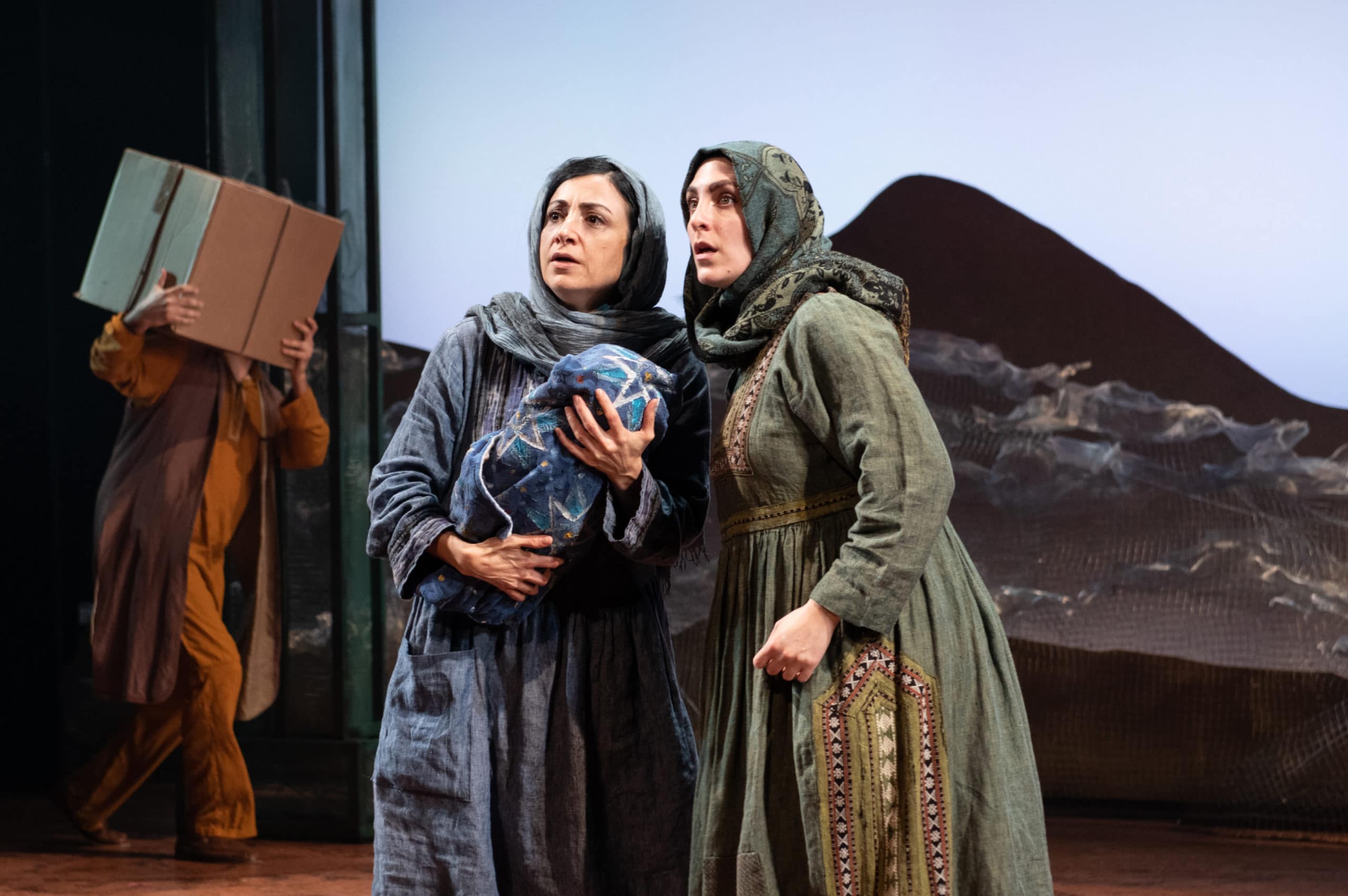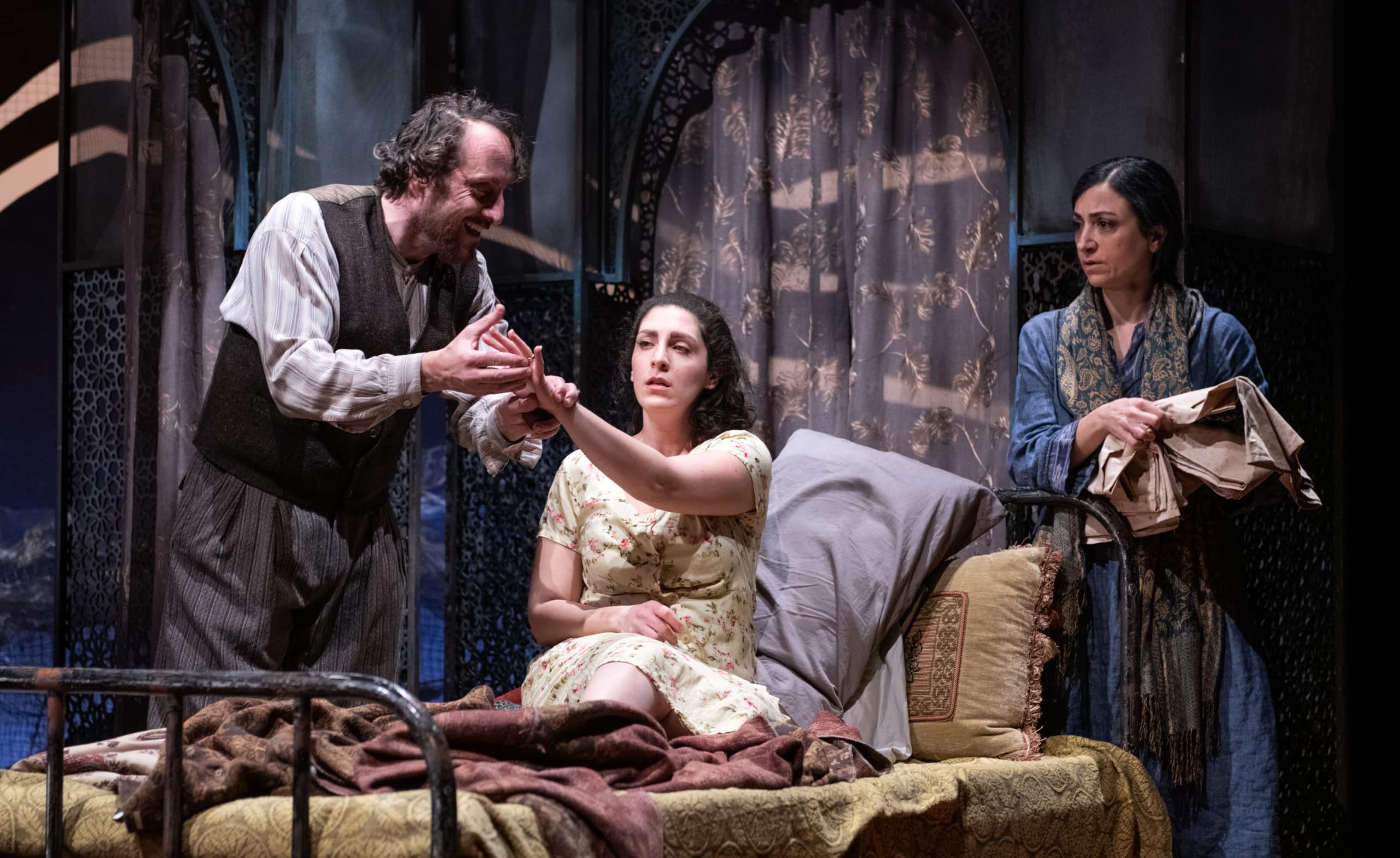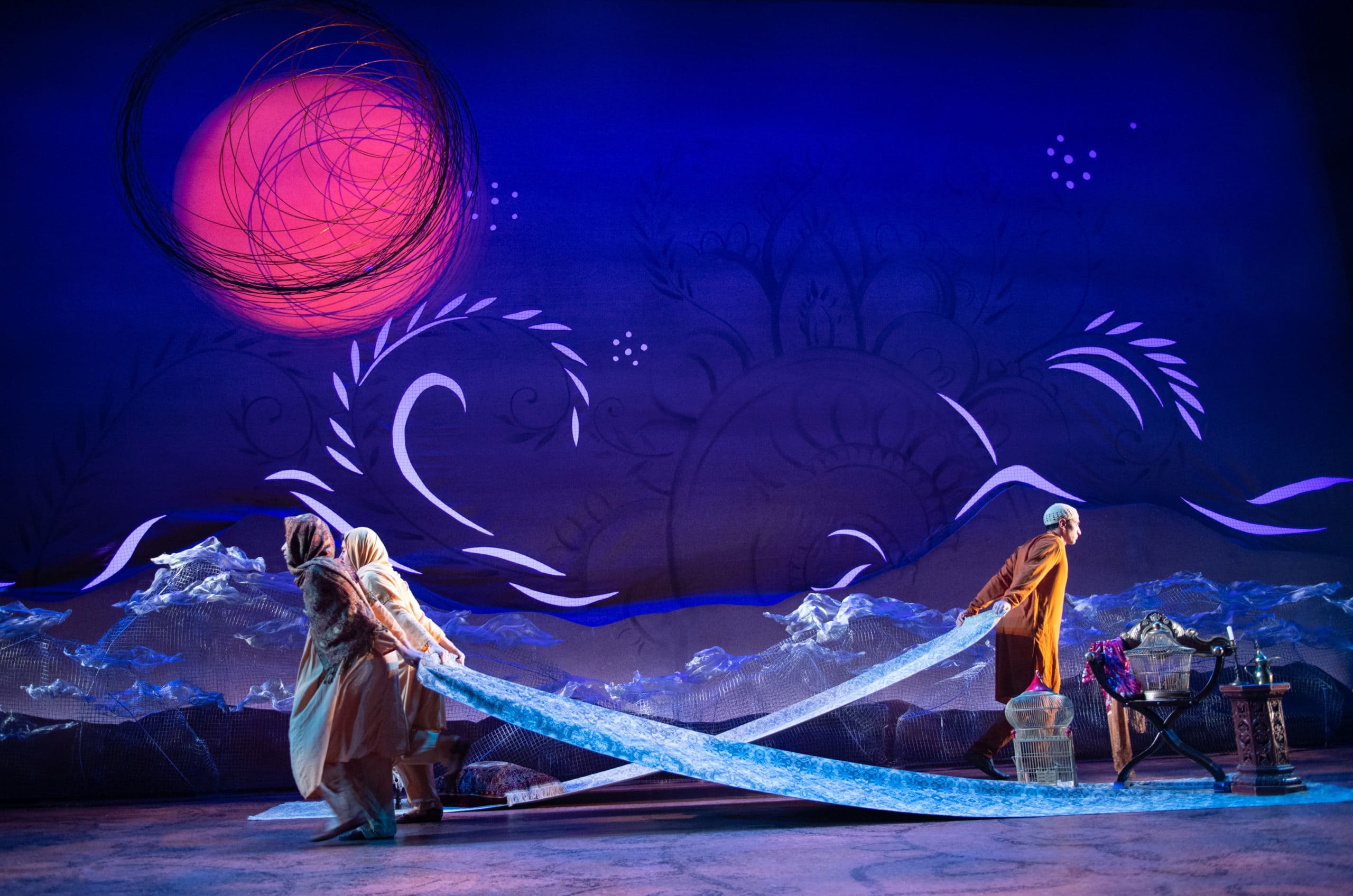You will not this season see a more beautiful, emotionally wrenching portrayal of profound love than in Arena Stage’s production of Ursula Rani Sarma’s A Thousand Splendid Suns. Based on Khaled Hosseini’s novel of the same title, it follows the lives of two Afghan women whose struggle for dignity, indeed for their very lives, is as endless as the wars and patriarchal culture that have long characterized their society.

The play spans roughly the interval between the Soviet withdrawal in 1989 and the American occupation in the early 2000s, a period first of civil war and then of Taliban rule. As 15-year-old Laila (Mirian Katrib) and her family prepare to flee the fighting for the relative safety of Pakistan, her parents are killed by a shell, leaving the girl in the care of their neighbors, Mariam (Hend Ayoub) and her husband Rasheed (Haysam Kadri).
Rasheed decides to take Laila as his second wife, and she is soon pregnant. Mariam is initially jealous of and cold to the younger woman. But they are drawn together, initially allied for protection from their increasingly controlling and violent husband. Over the course of the play, moved in part by their mutual love for Laila’s children, they grow far closer, becoming for each other the dearest of companions.
In powerful and touching performances, Ayoub and Katrib capture their characters’ often raw, heightened emotions without a hint of actorly self-consciousness, making Mariam and Laila utterly believable. They switch rapidly and seamlessly between their older and younger selves. They handle more tender moments beautifully too, as when Mariam has a monologue about dreams for the future reminiscent of the spirit of West Side Story’s “Somewhere.”
Mariam and Laila want desperately want to escape the prison of their home and homeland but are frustrated repeatedly by cultural and political barriers. In a flashback to her tragic backstory, Mariam recalls her mother (Lanna Joffrey) saying that a woman’s only power is to endure.

They have a lot to endure, particularly their abusive treatment by Rasheed. He shouts at them. He demeans them. He beats them. He confines them. He denies them food. He favors Laila’s son, Zalmai (Ravi Mampara) over her daughter, Aziza (Nikita Tewani). He makes misogynist statements that, on a few occasions, drew gasps from the audience. Fight consultant Lewis Shaw’s work with the actors makes the domestic violence harrowing.
Without excusing Rasheed’s conduct, the playwright and Kadri probe its origins. He comes from a culture that entitles men to rule women. He at least half-believes that he is doing what it is necessary to protect his family and its honor. The war has deprived him of the main source of his livelihood, and his frustration at being unable to play the provider role gnaws at him. His last remaining control seems to be over his wives.
When the Taliban take power, they impose harsh, detailed restrictions on women’s lives and make daily survival even more tenuous. Such is the privation of the times that the women’s hospital has no oxygen or anesthetics, forcing Laila, in a terrifying scene, to endure major surgery without it.
Zalmai and Aziza have significant roles, the latter emphasizing her desire to learn despite Taliban prohibitions on girls’ education and the former the pernicious effect of cultural encouragement of male power over women. Because his father tells him he can, Zalmai bullies his sister until the women reprove him (one imagines that Rasheed’s father had taught Rasheed the same lesson). Even in the comparative safety of an underground school for girls, Aziza’s stress leaves her with a stutter. A source of hope for the family is Tariq (Antoine Yared), Laila’s true love, whose relationship to women emphasizes kindness rather than domination. Tariq hobbles on a bad leg; perhaps his experience of vulnerability gives him greater empathy than the other male characters.
The technical side of the production matches the quality of the acting. Robert Wierzel’s lighting design emphasizes reds, purples, and oranges, colors as bold as the writ-large emotions of the piece. The climax of the design is a brief, transcendent burst of pure white, a dramatic statement needing no words to accompany it.
The precision of Jake Rodriguez’s sound design is exemplified by snapping sounds timed to accompany each stroke when Rasheed whips his wives with his belt. The explosion that destroys Laila’s house is another striking sound moment. David Coulter’s often darkly lyrical instrumental music helps set the mood of scenes without attempting to imitate Afghan or South Asian music.

The base of Ken Macdonald’s set is the brown outline of a mountain range. A large, flown-in drop, with a series of variously-shaped cutouts through which the changing light colors behind it show, is shaped to fit, jigsaw-puzzle like, over the shapes of the mountains. Raising and lowering it, with different colors of lights or projections involved, effectively supports the tone of various scenes. Actors wheel tall rectangular pieces on stage to form portions of houses or other structures. Working together with the other technical elements, the set creates an absorbing world in which the characters’ lives unfold.
Interestingly, this is the second time in the last several years that Arena Stage has looked at the situation of women in Afghanistan. Charles Randolph-Wright’s Love in Afghanistan, presented in the 2013 season, explored the very interesting life of a young woman in very different circumstances during the American era in the country, though without the same depth of feeling created in A Thousand Splendid Suns. (Joseph Kamal, who plays a number of small roles in the current show, also appeared in the earlier production.)
Director Carey Perloff first put this production together for the American Conservatory Theater in San Francisco, and her adaptation of the piece to the Kreeger Theater space works in all its aspects. This is not always an easy show to watch: the anger and sadness and suffering of the characters demand real involvement on the part of the audience. But such involvement is richly rewarded. The combination of strong, evocative writing; fearless performances by the actors; and a superb physical production makes A Thousand Splendid Suns a show to remember.
Running Time: 2 hours and 30 minutes, including one intermission.
A Thousand Splendid Suns plays through March 1, 2020, in the Kreeger Theater at Arena Stage, 1101 6th Street SW, Washington DC. For tickets, call 202-488-3300 or go online.
Zalmai, Justin Xavier Porlas; Wakil, Jason Kapoor; Ensemble, Sarah Corey, Yousof Sultani; Choreographer, Stephen Buescher; Costume Designer, Linda Cho; Vocal Coach, Anita Maynard-Losh; Stage Managers, Dani Bae, Christi B. Spann; Assistant Stage Manager, Marne Anderson




